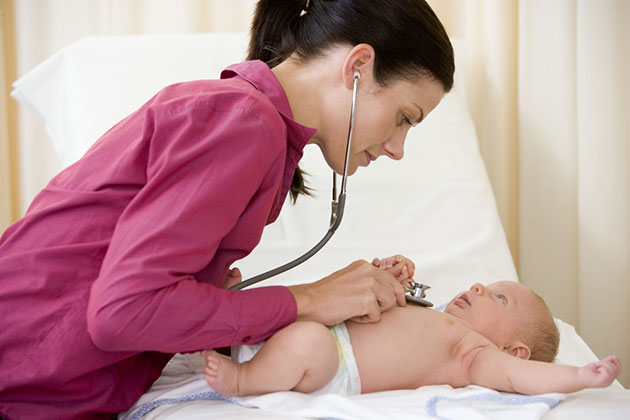Advice Articles
- Home
- Advice Articles
- Baby Skincare
- Post Natal Check and 8 Week Review
Post Natal Check and 8 Week Review

The 8 week review will be carried out either at your local doctor’s surgery or clinic, or at home by a health visitor and GP.
You’ll stay with your baby at all times and you will be asked different questions while your health visitor will check that baby is feeding well, gaining weight normally, and his/her vision, hearing and coordination are developing as they should.
It’s also a great opportunity to ask any questions that you may have, and it’s a good idea to write these down so you don’t forget them – the baby brain and lack of sleep won’t be doing much for your memory! Also remember to take your baby’s Personal Child Health Record (red book) with you so they can record your baby’s results.
Your healthcare professional checks:
Checks for your baby
- Heart – using a stethoscope, he/she will look out for any heart murmurs. These are quite common (up to 80% of children have a heart murmur at one point or another) and in most cases harmless, so even if a heart problem that requires treatment is picked up, it might not necessarily be anything to worry about. Further tests by a specialist will be conducted if anything out of the ordinary shows up.
- Hearing – this is usually already checked by 4-5 weeks, but if it hasn’t happened yet, it will at the 6 week review. There are a series of easy tests that doctors can carry out, such as clapping their hands behind baby’s head to see if he/she startles.
- Lungs, spine, and genitals – if your baby is a boy, then your doctor will check the opening on his penis as well as that both his testicles have descended into the scrotum. If your baby is a girl, she will be checked to make sure all is developing as it should in her vaginal area
- Hips – your baby’s legs will be gently manipulated to check for clicky hips. This terms describes a variety of hip problems, including developmental dysplasia (DDH) or congenital dislocation of the hips (CDH). If anything is picked up, further investigation using ultrasounds may be needed, with about one of two in 1,000 babies will require some form of treatment.
- Vision and general responses – your health visitor will check if baby can focus on an object and follow it, will also make sure your baby is smiling, cooing, gurgling and crying as expected for this age.
- Weighing and measuring – if your health visitor will want to weigh the baby, then you will need to remove all his/her clothing including the nappy. Your baby’s head circumference might also be measured.
- Feeding – Your health visitor will enquire about your baby’s feeding routine, if breastfeeding she will most likely carry out a breastfeeding assessment to ensure your baby is showing signs of an effective breastfeed. This includes frequent wet and dirty nappys, being alert, good colour, good muscle tone and good weight gain. If you have any feeding concerns now is the time to ask questions.
Your health visitor and doctor will explain all the tests whilst they are being carried out as well as the results, which are then recorded in your baby’s red book or Personal Child Health Record.
This is a good opportunity to discuss any worries you might have, including: immunisations, cot death (SIDS), skincare, colic, allergies, breastfeeding, and anything else that is on your mind.
Checks for you
The GP will check that your kidneys are working normally and that there is no infection with a urine test, he will also test your blood pressure, along with a quick examination to feel your tummy in order to check that your uterus (womb) has contracted down properly. You will be weighed to make sure you’re returning to your previous size, and if you are having problems you’ll be offered advice. Your stiches (if you had any) may be checked to see if they are healing properly, and a cervical screening test (smear test) may be booked if you haven’t had one in the last three years. If you aren’t immune to Rubella and weren’t offered the immunisation jab in the hospital then you will be offered one now – you should try to avoid getting pregnant within a month of having the vaccine. Your GP will also ask you about whether you have had a period since the birth and if you are still having any vaginal discharge. The GP may check your breasts during the check up, but if not make a point of telling the doctor if they’re sore, this could be mastitis or engorgement. If you feel you have engorgement or mastitis speak to your health visitor for advice on preventing on worsening or reoccurring. Your health visitor may prescribe hot and cold breast therapy to ease the symptoms for example, our TheraPearl 3in1 Breast Therapy. After seeing your GP you will also visit your health visitor who will carry out a mood assessment to identify anysigns of postnatal depression.
Tell your doctor if:
- You’re having trouble holding urine or wind, or if you’re soiling yourself
- Sex is painful
- You’re feeling very tired (even more so than you would expect), low or depressed
- If you’re worried about anything at all
